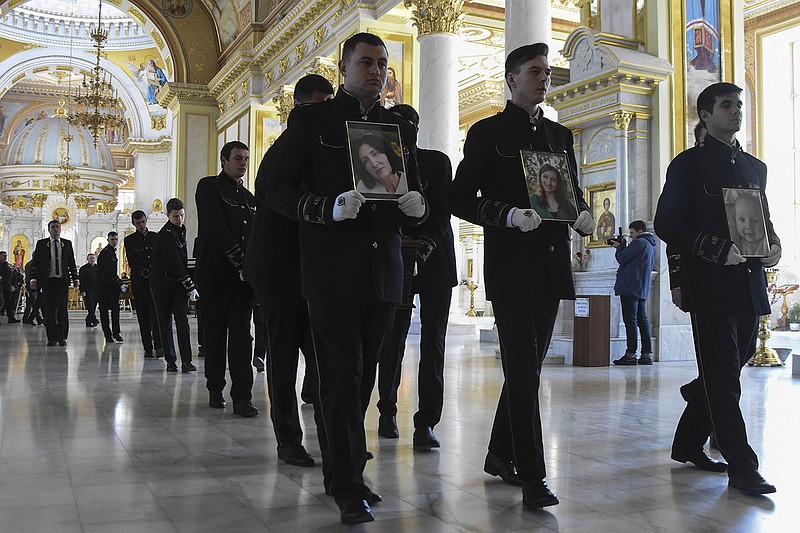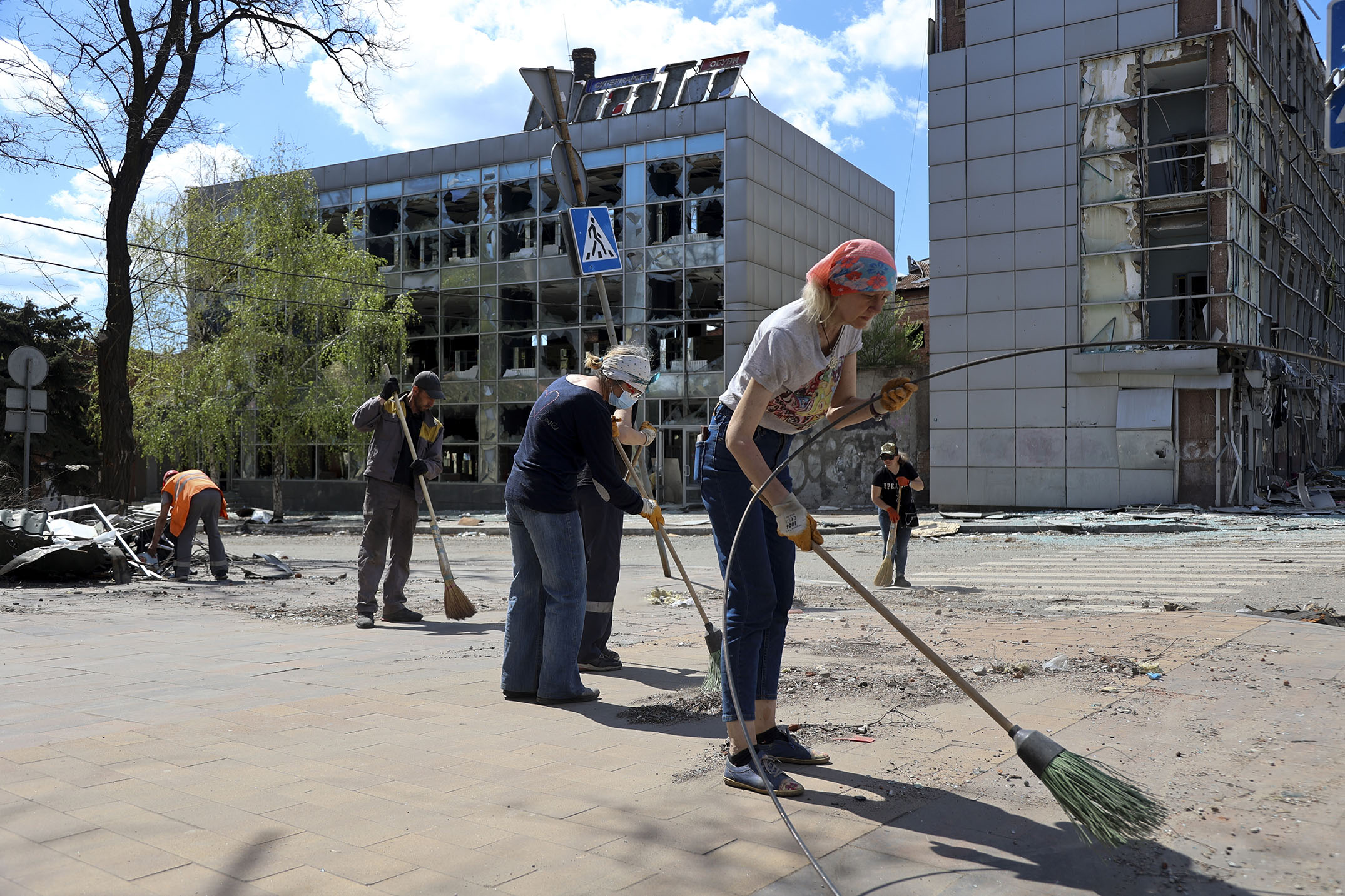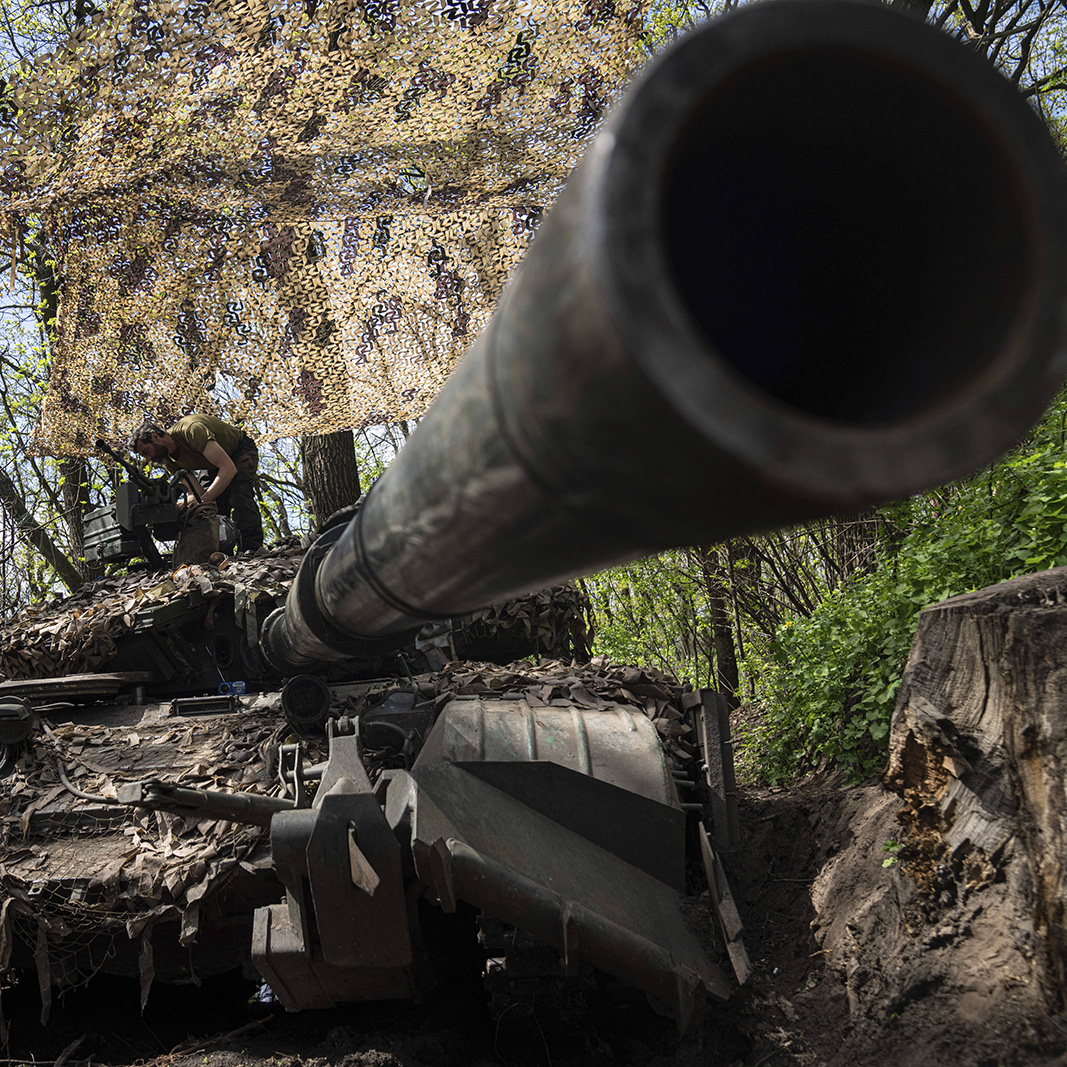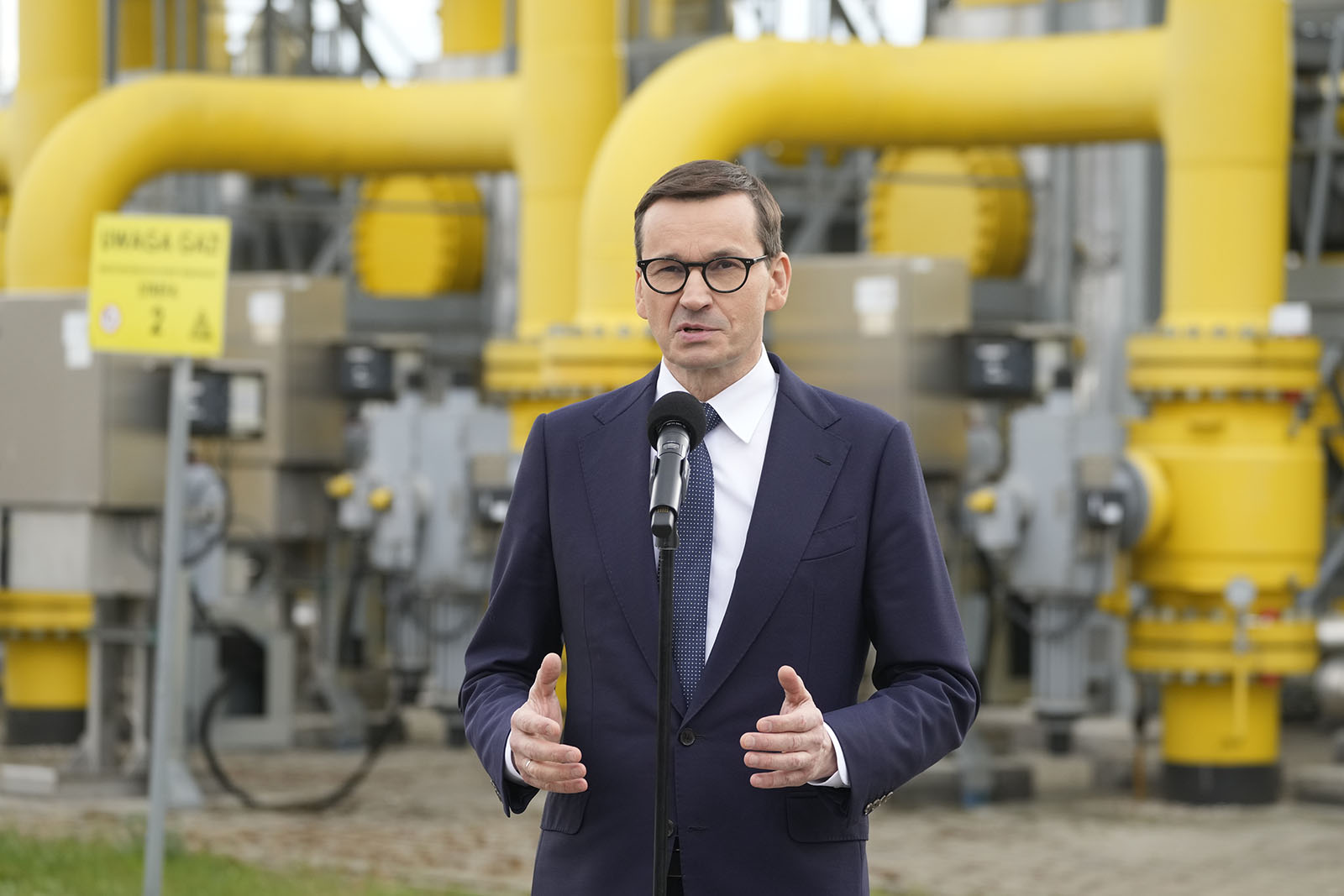POKROVSK, Ukraine -- Russia cut off natural gas to NATO members Poland and Bulgaria on Wednesday and threatened to do the same to other countries, using its most export in what was seen as a bid to punish and divide the West over its support for Ukraine.
The move, condemned by European leaders as "blackmail," marked an escalation in the economic war of sanctions and countersanctions that has unfolded in parallel to the fighting on the battlefield.
The tactic, coming a day after the U.S. and other Western allies vowed to rush more and heavier weapons to Ukraine, could eventually force targeted nations to ration gas and could deal another blow to economies suffering from rising prices. At the same time, it could deprive Russia of badly needed income to fund its war effort.
Poland has been a major gateway for the delivery of weapons to Ukraine and confirmed this week that it is sending the country tanks. Just hours before Russia's state energy giant Gazprom acted, Poland announced a new set of sanctions against the company and other Russian businesses and oligarchs.
Bulgaria, under a new liberal government that took office last fall, has cut many of its old ties to Moscow and likewise supported punitive measures against the Kremlin. It has also hosted Western fighter jets at a new NATO outpost on Bulgaria's Black Sea coast.
The gas cuts do not immediately put the two countries in any dire trouble. Poland, especially, has been working for many years to line up other suppliers, and the continent is heading into summer, making gas less essential for households.
Also, Russian gas deliveries to both Poland and Bulgaria were expected to end later this year regardless.
Still, the cutoff and the Kremlin warning that other countries could be worried the 27-nation European Union. Germany, the largest economy on the continent, and Italy are among Europe's biggest consumers of Russian natural gas, though they, too, have been taking steps to reduce their dependence on Moscow.
"It comes as no surprise that the Kremlin uses fossil fuels to try to blackmail us," said EU Commission President Ursula von der Leyen. "Today, the Kremlin failed once again in his attempt to sow division amongst member states. The era of Russian fossil fuel in Europe is coming to an end."
Gazprom said it shut off the two countries because they refused to pay in rubles, as President Vladimir Putin has demanded of "unfriendly" nations.
The Kremlin said other countries may be cut off if they don't agree to the payment arrangement.
Most European countries have publicly balked at Russia's demand for rubles, but it is not clear how many have actually faced the moment of decision so far. Greece's next scheduled payment to Gazprom is due on May 25, and the government must decide then whether to comply.
Polish Prime Minister Mateusz Morawiecki told his country's parliament that he believes Poland's support for Ukraine -- and the new sanctions imposed by Warsaw on Tuesday -- were the real reasons behind the gas cutoff.
Bulgarian Prime Minister Kiril Petkov called the suspension blackmail, adding: "We will not succumb to such a racket."
Ukrainian President Volodymyr Zelenskyy said that Russia views gas as a weapon for political blackmail and "sees a united Europe as a target."
Simone Tagliapietra, senior fellow at the Bruegel think tank in Brussels, said Russia's goal in cutting off the flow of gas is to "divide and rule" -- pit European countries against one another as they cast about for energy.
While Poland gets around 45% of its gas from Russia, it relies overwhelmingly on coal and said it was well prepared for the cutoff. It has ample gas in storage and will soon benefit from two pipelines coming on line, analyst Emily McClain of Rystad Energy said.
Bulgaria gets over 90% of its gas from Russia, but a pipeline connection to Greece is set to be completed later this year.
Dobrin Todorov, a resident of Bulgaria's capital, Sofia, said the suspension is not a big problem.
"Ultimately, the choice between freedom and dignity or gas, the answer is clear, in favor of freedom and dignity," Todorov said, adding that a lack of gas "cannot be compared to the hardship and tribulations that the Ukrainian people are currently suffering."
Europe is not without its own leverage, since it is paying some $400 million a day to Russia for gas, money Putin would lose in a complete cutoff. Russia can, in theory, sell oil elsewhere -- to India and China, for instance. But it doesn't have the necessary pipelines in some cases, and it has only limited capacity to export gas by ship.
"The move that Russia did today is basically a move where Russia hurts itself," von der Leyen said.
FIGHTING IN THE EAST
On the battlefield, fighting continued in the country's east along a largely static front line some 300 miles long.
Russia claimed its missiles hit a batch of weapons that the U.S. and European nations had delivered to Ukraine. One person was killed and at least two were injured when rockets hit a residential neighborhood in Kharkiv.
Western officials said Russia has made slow progress in the Donbas region, with "minor gains," including the capture of villages and small towns south of Izyum and on the outskirts of Rubizhne.
Serhiy Haidai, the governor of the Luhansk region, conceded that Russia has made a little progress in its advance on Rubizhne through its nearly constant bombardment, but that Ukrainian troops are fighting back and retreating only when there is nothing left to defend.
"There is no point in staying on territory that has been fired on so often that every meter is well known," he said.
The Western officials said some Russian troops have been shifted from the gutted southern port city of Mariupol to other parts of the Donbas. But some remain in Mariupol to fight Ukrainian forces holed up at the Azovstal steel plant, the last stronghold in the city. About 1,000 civilians were said to be taking shelter there with an estimated 2,000 Ukrainian defenders.
"The situation is very difficult. There are huge problems with water, food," Serhii Volynskyi, commander of the marine unit inside the plant, said.
He said hundreds of fighters and civilians were wounded and in need of medical help, and those inside included children, older people and disabled people.
In the Black Sea port city of Kherson, which Russian forces have occupied since early in the war, a series of explosions boomed late Wednesday near the television tower and at least temporarily knocked Russian channels off the air, Ukrainian and Russian news organizations reported.
Just across the border in Russia, an ammunition depot in the Belgorod region burned after several explosions were heard, the governor said. Blasts were also reported in Russia's Kursk region near the border, and authorities in Russia's Voronezh region said an air defense system shot down a drone.
Earlier this week, an oil storage facility in the Russian city of Bryansk was engulfed by fire.
Ukrainian presidential adviser Mykhailo Podolyak hinted at the country's involvement in the fires, saying that "karma (is) a harsh thing."
With the help of Western arms, Ukrainian forces managed to thwart Russian forces' attempt to storm Kyiv. Moscow now says its focus is the capture of the Donbas, Ukraine's mostly Russian-speaking industrial heartland.
A defiant Putin vowed Russia will achieve its military goals, telling parliament, "All the tasks of the special military operation we are conducting in the Donbas and Ukraine, launched on Feb. 24, will be unconditionally fulfilled."
CYBER BATTLEGROUND
On the technological battlefield, cyberattacks by state-backed Russian hackers have destroyed data across dozens of organizations in Ukraine and produced "a chaotic information environment," Microsoft says in a report released Wednesday.
Nearly half the destructive attacks were against critical infrastructure, many times simultaneous to physical attacks, the report notes.
A top Ukrainian cybersecurity official, Victor Zhora, told reporters on Wednesday that cyberattacks on telecommunications have sometimes coincided with artillery and other physical attacks.
Microsoft assessed that Russia-aligned threat groups were "pre-positioning for the conflict as early as March 2021," hacking into networks to obtain footholds they could later use to collect "strategic and battlefield intelligence or to facilitate future destructive attacks."
During the war, Russia's cyberattacks "have at times not only degraded the functions of the targeted organizations but sought to disrupt citizens' access to reliable information and critical life services, and to shake confidence in the country's leadership," the company's Digital Security Unit says in the 20-page report.
Kremlin cyber operations "have had an impact in terms of technical disruption of services and causing a chaotic information environment, but Microsoft is not able to evaluate their broader strategic impact," the report says.
Disruption from Russian cyber activity has been more modest than many anticipated ahead of the Feb. 24 invasion, and Microsoft said damaging attacks have "been accompanied by broad espionage and intelligence activities."
Early on, a cyberattack that also affected European broadband users knocked out satellite service to Ukrainian military, police and other institutions. But Ukrainian defenders, aided by outside cybersecurity firms, have also scored victories. Microsoft and Slovakia-based ESET helped them thwart an attempt earlier this month to cut power to millions of Ukrainians.
The report says groups with known or suspected ties with Russia's GRU military intelligence agency have used destructive "wiper" malware "at a pace of two to three incidents a week since the eve of the invasion."
From the invasion onset until April 8, Microsoft said at least eight different malware strains were used in "nearly 40 discrete destructive attacks that permanently destroyed files in hundreds of systems across dozens of organizations in Ukraine."
In an accompanying blog, Microsoft executive Tom Burt noted that the company had also seen "limited espionage attack activity" targeting NATO member states.
Information for this article was contributed by Yesica Fisch, Jon Gambrell, Vanessa Gera, Frank Bajak, Jill Lawless, Yuras Karmanau, David Keyton, Oleksandr Stashevskyi, Mstyslav Chernov and staff members of The Associated Press.



